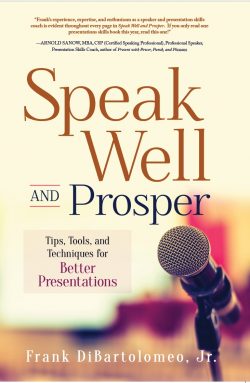Pay It Forward

“We make a living by what we get; we make a life by what we give.”
— Winston Churchill, former Prime Minister of Great BritainLast Tuesday, I was contacted by someone I worked with forty (40) years ago. He is now a business professor at Liberty University in Lynchburg, Virginia.
I had not talked to him in those forty years, but he found me on LinkedIn and knew I ran a company that provided public speaking coaching services.
He asked if I would talk to his Introduction to Business class about business presentation skills. I welcomed the opportunity. So, I fired up Zoom on my laptop and spoke to the first- and second-year students in my friend’s class.
It was gratifying to talk to our country’s future business people and leaders. It made me think about how valuable giving back is.
This article is about my giving back to you. I am sure you have been helped by a trusted friend, relative, or teacher. They gave you advice that has helped you speed up acquiring knowledge you need in your life.
I have no idea how old you are, but it doesn’t matter if you are twenty-four, forty-four, or sixty-four. You know something that other people in the world desperately want to know. Your job is to find them and benefit them from your knowledge.
Now, you are reading this article because you are a speaker. What could you tell others that would improve their speaking ability and pay it forward? Below are my contributions. Let me know the speaking knowledge you want to pay forward by sending me a message at frank@speakleadandsucceed.com with the subject “Pay it Forward.”
Face Your Fear and the Death of Fear is Certain
Ralph Waldo Emerson said, “Face your fear, and the death of fear is certain.”
Courage is not the lack of fear. It is working through your fear.
The fear of public speaking is genuine. You have two choices: let the fear choose for you – don’t speak or decide to work through your fear of public speaking – seek out opportunities to speak.
The late Earl Nightingale, a radio and television personality, said a full 94% of our fears are things that will never happen or have happened in the past for which we have no control.
When you fear public speaking, you may ask yourself, “What if they laugh at me? Or “What do I have to say that someone else would want to hear? Or “I am not a natural-born speaker. I would embarrass myself.”
I will say the feelings you have are neither good nor bad. They just are. However, I will also say I believe the fear anyone has of public speaking can be reduced considerably. The nervousness that can result from fear can energize your presentation. Believe it or not.
When you feel the fear of public speaking overwhelming, you should try the following:
Do the thing you fear repeatedly. Then, use gradual desensitization to lessen your fear.
Realize your audience wants you to succeed. Give them what they want – your successful presentation.
Only the prepared speaker deserves to be confident. Practice your presentation repeatedly until you are satisfied it is ready to be delivered to your audience. The way you deliver your presentation in practice is how you will deliver it when it comes. Practice reduces the fear of public speaking.
So, realize there are practical ways to reduce your fear of public speaking.
Public speaking is hard at first. Speaking to an audience is always harder until it gets easier, just like anything else you have done.
Speaking is Always Hard Until It Gets Easier
If you are an accomplished pianist, could you play the piano when you started learning like you can now? Unfortunately, no. But you stuck with it and are now an accomplished pianist.
If you are an expert cabinet maker, could you make cabinets when you started learning to make cabinets like you can now? Unfortunately, no. But you stuck with it and are now an expert cabinet maker.
If you are or are on your way to becoming an excellent speaker, could you speak as well when you started learning like you can now? Unfortunately, no. But you stuck with it, and now you are on your way to becoming an excellent speaker.
In the book Outliers by Malcolm Gladwell, he tells the story of the Beatles band in the late nineteen fifties and early nineteen sixties. They used to play all night at nightclubs in Hamburg, Germany. This constant repetition made the Beatles the great band they were.
Malcolm Gladwell tells us in Outliers to become an expert in anything, it takes about ten thousand hours. So if you do the activity for eight hours a day, five days a week, for five years, you will hit the required ten thousand hours.
I am not saying to devote forty hours per week for five years. However, the Beatles’ story gives you why they were so good and caught Great Britain and the United States by storm in the nineteen sixties. They had a sound that was never heard before.
Persistence in speaking and every other area of your life is even more important than talent. For example, read this quote by Calvin Coolidge, the thirtieth President of the United States:
“Nothing in the world can take the place of persistence. Talent will not; nothing is more common than unsuccessful men with talent. Genius will not; unrewarded genius is almost a proverb. Education will not; the world is full of educated derelicts. Persistence and determination alone are omnipotent. The slogan Press On! has solved and always will solve the problems of the human race.”
Any activity, including public speaking, is hard until it gets easier. The problem is that people give up too quickly and never even get close to the ten thousand hours required to become an expert at the activity. Don’t be like this. Stick-to-it-ness will always put you on the road to success.
So, there are ways to reduce your fear of public speaking, and any activity, including public speaking, is always harder until it gets easier.
Not only do you help yourself when you help others. You also put yourself on the fast track to success.
Helping Others Helps You
I found out many years ago the best way to extract yourself from a melancholy period in your life is to stop thinking of your circumstances and help other people with their circumstances.
What you say in your speaking has a tremendous effect on others. But, unfortunately, as long as we cannot read people’s minds (I hope we never do), you may never know the effect your speaking has on your audience until they tell you.
It’s a common thread throughout all of your speaking. To help your audience, you need to know your audience. So arrive early before your presentation and stay later after it to talk to your audience and determine their concerns, wants, and needs.
Since you are the message, by knowing beforehand what your audience’s concerns, wants, and needs are, you can change anything in your presentation to be more relevant to your audience.
It’s been said the most interesting people are those more interested in others rather than themselves.
The most exciting networking events are where you attend not knowing anyone. Every person in the room is a “mystery” ready to be explored.
The key here is always putting the other person’s interests above your own. That’s the key to helping others when you speak. Do this, and you will be asked to come and speak again and again.
So, the ways I am paying it forward in this article are: (1) there are practical ways to reduce your fear of public speaking, (2) any activity, including public speaking, is always harder until it gets easier, and (3) if you want to put yourself on the fast track, help others through your speaking by learning your audience’s concerns, wants, and needs.
Pay forward the vast knowledge in your gray matter back to the world through your speaking.
You’ll be glad you did!
Call to Action
Reduce your fear of public speaking by repeatedly speaking, realizing your audience wants your presentation to succeed, and over prepare your presentation
Realize speaking is hard until it gets easier. Speak often, and it will become easier and more natural
To help yourself, help others.
“As we work to create light for others, we naturally light our own way.”
— Mary Anne Radmacher, author of uplifting booksFrank DiBartolomeo is a retired U.S. Air Force Lieutenant Colonel and award-winning speaker, presentation and interview skills coach, and Professional Member of the National Speakers Association. He was awarded Toastmasters International’s highest individual award, Distinguished Toastmaster because of his outstanding work in public speaking and leadership.
Frank formed DiBartolomeo Consulting International (DCI), LLC (www.speakleadandsucceed.com) in 2007. The mission of DCI is to help technical professionals to inspire, motivate, and influence their colleagues and other technical professionals by improving their presentation skills, communication, and personal presence. Reach Frank at frank@speakleadandsucceed.com and (703) 509-4424.
Don’t miss Frank DiBartolomeo’s latest book!
“Speak Well and Prosper: Tips, Tools, and Techniques for Better Presentations”

Available now at Amazon.com and BarnesandNoble.com
